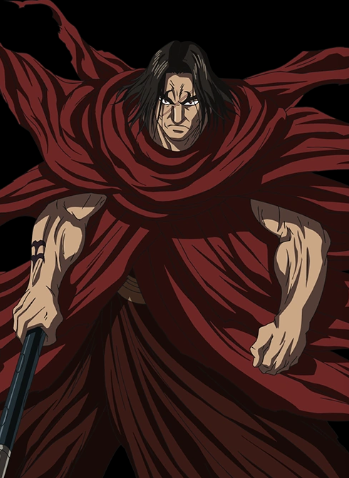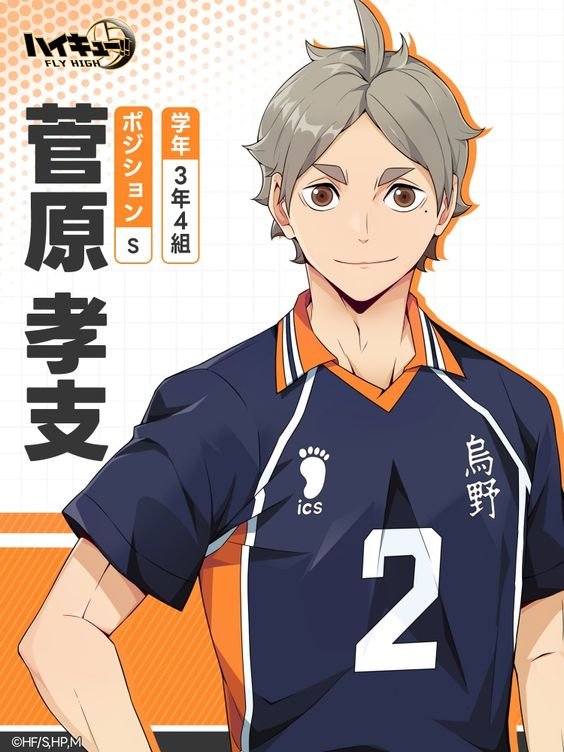
Hou Ken
Hou Ken |
|
|---|---|
 |
|
| Kanji: | 龐煖 |
| Romaji | Hou Ken |
| Statistics | |
| Age: | Presumably in his 40s |
| Birthday: | Unknown |
| Gender: | Male |
| Portrayed by: | |
| Japanese: | Masaya Takatsuka |
| English: | Kamran Nikhad |
Hou Ken (法顕, Hou Ken), was a martial artist and a revered figure known as a “Bushin,” a path seeker dedicated to the martial way. He was a member of a mysterious tribe of warriors who sought to end all wars and bring peace through their martial arts mastery. As one of Zhao’s Three Great Heavens, Hou Ken held the prestigious position of First Great, marking him as one of the most powerful and respected leaders in the military.
Hou Ken’s rivalry with Qin’s Great General Ou Ki defined much of his military career, with the two warriors clashing in numerous battles. He was also a key enemy of Shin, the leader of the Hi Shin Unit, engaging in multiple duels before their final confrontation at the Battle of Shukai Plains, which resulted in Hou Ken’s death. Despite his fearsome reputation and unmatched martial prowess, Hou Ken’s true goals were driven by a desire for peace, making him a complex and tragic figure.
Background

Appearance in Anime
Hou Ken was born into a mysterious tribe of path seekers known for their commitment to martial arts and a deep philosophy of seeking the end of war. His people, the Bushin, believed in achieving ultimate strength in combat with the ultimate goal of ending the bloodshed that plagued the world. This ideological approach to warfare set Hou Ken apart from other military leaders, as his purpose in battle was not only to conquer but to eventually bring about peace by eliminating the causes of conflict.
Despite his lofty ideals, Hou Ken’s role as a general for the state of Zhao in the Three Great Heavens made him an essential player in the Warring States period. His prowess as a martial artist and strategist was unparalleled, earning him the title of the First Great of Zhao’s military. Throughout his career, Hou Ken faced numerous powerful generals, most notably Qin’s Great General Ou Ki, his arch-nemesis, with whom he clashed in multiple major battles.
Appearance
Hou Ken has a commanding presence, both due to his formidable size and his fierce martial aura. His physical stature is that of a seasoned warrior, muscular and imposing, embodying the essence of a Bushin. He is often depicted in traditional warrior attire that reflects his martial philosophy simple yet effective armor suited for battle. His face, marked by sharp features, carries a look of seriousness and determination, mirroring his unwavering commitment to his martial path.
Hou Ken’s eyes, intense and focused, convey his inner resolve to achieve his goal of peace through strength. His entire appearance speaks to the years of rigorous training and battle, with scars and a weathered face reflecting his long-standing involvement in the warfare of the Warring States.
Personality
Hou Ken is defined by his stoic, calm, and disciplined personality. As a Bushin, he embodies the principles of martial purity and spiritual enlightenment. He follows the path of the warrior with an unwavering commitment to his ideals, believing that through the mastery of martial arts, he could bring an end to the endless wars that ravaged the land.
Despite his violent career and his status as a fierce military leader, Hou Ken’s ultimate goal was peace—he sought to eliminate war, not through diplomacy or surrender, but through the strength of martial power. This paradox makes Hou Ken a complex and tragic figure: a warrior who believes in peace but is forced to perpetuate war in order to achieve it.
Hou Ken’s stoicism and emotional reserve often make him appear cold and detached, but beneath his hardened exterior lies a warrior with deep convictions. His fierce rivalry with Ou Ki and his battles with Shin were more than personal vendettas; they were a reflection of his inner conflict and his dedication to his ideals, even if it meant going against the very people he sought to protect.
Role in the Story
The Slayer of Generals: Hou Ken first appears as the killer of Qin’s Great General Ou Ki, one of the most emotionally impactful deaths in the series. His surprise intervention during the Battle of Bayou and brutal slaying of Ou Ki cements his position as Shin’s sworn enemy and a looming threat to Qin’s ambitions.
Confrontations with Shin: Hou Ken reappears during several key conflicts, where he and Shin of the Hi Shin Unit face off in brief but brutal clashes. Each encounter pushes Shin to grow stronger, both physically and ideologically, as he seeks not just revenge but the power to protect others.
The Battle at Shukai Plains: During the final day of the Battle of Shukai Plains, Hou Ken engages Shin in a climactic duel. Their philosophies Shin’s belief in human bonds and Hou Ken’s solitary path clash violently. In one of the series’ most emotionally charged moments, Shin defeats Hou Ken, ending the Bushin’s life and symbolizing the triumph of collective will over solitary obsession.
Relationships
Ou Ki: Hou Ken’s greatest adversary and philosophical opposite. While Hou Ken fought to perfect himself through combat, Ou Ki believed in fighting for others. Their duel at Bayou ends in Ou Ki’s death, setting a long-standing grudge in motion.
Shin (Ri Shin): Shin serves as Hou Ken’s final opponent and ideological foil. Their confrontations represent more than battle they symbolize the war between individualistic detachment and the power of shared purpose. Shin’s ultimate victory signifies the defeat of Hou Ken’s solitary philosophy.
Riboku: Riboku, Zhao’s strategic mastermind, viewed Hou Ken as a valuable military asset but did not share his ideology. Their alliance was tactical, not emotional, with Riboku often using Hou Ken’s brute strength as a trump card in battle.